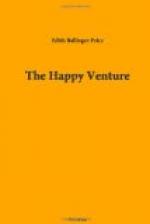“Without a word, the old gentleman, still holding Kirk’s hands, pushed him gently into the chair he had himself been sitting in. There was a little time of stillness, filled only by the crack and rustle of the fire. Then, into the silence, crept the first dew-clear notes of Chopin’s F Sharp Major Nocturne. The liquid beauty of the last bars had scarcely died away, when the unseen piano gave forth, tragically exultant, the glorious chords of the Twentieth Prelude—climbing higher and higher in a mournful triumph of minor chords and sinking at last into the final solemn splendor of the closing measures. The old gentleman turned on the piano-stool to find Kirk weeping passionately and silently into the cushions of the big chair.
“Have I done more than I meant?” he questioned himself, “or is it only the proof?” His hands on Kirk’s quivering shoulders, he asked, “What is it?”
Kirk sat up, ashamed, and wondering why he had cried. “It was because it was so much more wonderful than anything that ever happened,” he said unsteadily. “And I never can do it.”
The musician almost shook him.
“But you can,” he said; “you must! How can you help yourself, with those hands? Has no one guessed? How stupid all the world is!”
He pulled Kirk suddenly to the piano, swept him abruptly into the wiry circle of his arm.
“See,” he whispered; “oh, listen!”
He spread Kirk’s fingers above the keyboard—brought them down on a fine chord of the Chopin prelude, and for one instant Kirk felt coursing through him a feeling inexplicable as it was exciting—as painful as it was glad. The next moment the chord died; the old man was again the gentle friend of the fireside.
“I am stupid,” he said, “and ill-advised. Let’s have tea.”
The tea came, magically—delicious cambric tea and cinnamon toast. Kirk and the old gentleman talked of the farm, and of Asquam, and other every-day subjects, till the spring dusk gathered at the window, and the musician started up. “Your folk will be anxious,” he said. “We must be off. But you will come to me again, will you not?”
Nothing could have kept Kirk away, and he said so.
“And what’s your name, please?” he asked. “I’ve told you mine.” A silence made him add, “Of course, if you mind telling me—”
Silence still, and Kirk, inspired, said:
“Phil was reading a book aloud to Mother, once, and it was partly about a man who made wonderful music and they called him ‘Maestro.’ Would you mind if I called you Maestro—just for something to call you, you know?”
He feared, in the stillness, that he had hurt his friend’s feelings, but the voice, when it next spoke, was kind and grave.
“I am unworthy,” it said, “but I should like you to call me Maestro. Come—it is falling dusk. I’ll go with you to the end of the meadow.”
And they went out together into the April twilight.




